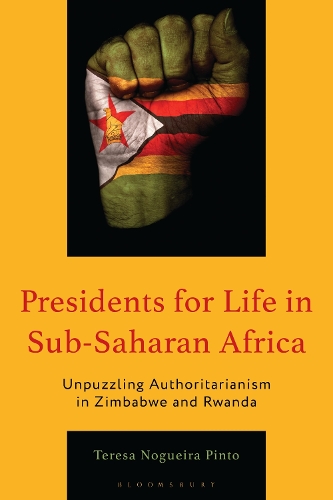
Presidents for Life in Sub-Saharan Africa: Unpuzzling Authoritarianism in Zimbabwe and Rwanda
(Hardback)
Publishing Details
Presidents for Life in Sub-Saharan Africa: Unpuzzling Authoritarianism in Zimbabwe and Rwanda
By (Author) Teresa Nogueira Pinto
Bloomsbury Publishing PLC
Rowman & Littlefield Publishers
11th December 2025
United States
Classifications
Professional and Scholarly
Non Fiction
320.011
Physical Properties
Hardback
256
Width 152mm, Height 229mm
Description
Teresa Nogueira Pinto analyzes how Robert Mugabe and Paul Kagame developed narratives to legitimize and entrench their power in Rwanda and Zimbabwe.
From South America to Eastern Europe, semi-authoritarian leaders often deploy strategies of power legitimation rooted in historical legacies, political institutions, legal and constitutional frameworks, economic conditions, and shifting regional and international dynamics. This framework is particularly pertinent in an era when authoritarianism is evolving and liberal democracy is facing a prolonged period of decline. In Presidents for Life in Sub-Saharan Africa: Unpuzzling Authoritarianism in Zimbabwe and Rwanda, Pinto examines how Robert Mugabe and Paul Kagame used these strategies in their personalized, semi-authoritarian, and resilient regimes in Sub-Saharan Africa as well as how their claims to legitimacy were challenged by opponents and civil society. She emphasizes that these strategies are not developed in isolation but have, instead, emerged from leaders continuous interactions and negotiations in legal, political, and economic spheres. Recognizing that the legitimation of power operates across different dimensions, this book adopts a multidimensional approach to show how authoritarian leadership is constructed and challenged. Through comparison of these two African leaders, this book unveils the tactics used by authoritarian leaders to consolidate power and navigate threats to their authority.
Reviews
Presidents for Life in Sub-Saharan Africa: Unpuzzling Authoritarianism in Zimbabwe and Rwanda offers a compelling and nuanced analysis of the political strategies employed by the semi-authoritarian regimes of Robert Mugabe and Paul Kagame to secure and sustain legitimacy. Using a multidimensional framework, the book employs process tracing to examine the interplay between historical narratives, legal and institutional frameworks, economic policies and outcomes, statecivil society relations, and foreign policy choices in both countriesrevealing the multi-causal dynamics underpinning semi-authoritarian resilience. This book is an essential resource for scholars, students, and practitioners of African politics, authoritarianism, and international relations. * Ricardo Real P. de Sousa, Professor of International Relations, University of Beira Interior, Portugal *
Author Bio
Teresa Nogueira Pinto is Professor of Political Science at Lusfona University and an integrated researcher at LusoGlobe, Lusfonas Centre on Global Challenges, Portugal.
